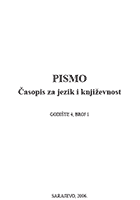The Orient and the Occident in Shakespearean Drama
The Orient and the Occident in Shakespearean Drama
Author(s): Shahab Yar KhanSubject(s): Literary Texts
Published by: Bosansko filološko društvo
Keywords: Othello; cultural alliance; historical matrix of Shakespearean drama; mobile playwright; stage as vacancy; crusades
Summary/Abstract: All the world is Shakespeare’s stage. He has played many parts and has had his exits and his entrances. Over the centuries, the textual and inter-textual history of his plays has been written down time and time again. As a result, not only the otherwise fossilized Elizabethan world finds a life giving force in Shakespearean drama but also the literary criticism in general, considered as ‘barren landscape’ by ordinary readers, receives fresh air from his art. He as a cliché is ‘for all times’ and therefore, his characters enact the tensions of intercultural, interracial and interreligious encounters. Jonathan Burton for example in his article, A Most Willy Bird, Leo Africanus, Othello and the Trafficking in Difference, pays attention to how religious difference, especially Islam, shaped early modern discourses of race and culture. Burton places both Othello and Leo Africanus’ Geographical Historie of Africa, the work which gave 16th century readers most of their information on Africa, into history. He argues that Othello’s relationship to European Christianity allows him less space for the subversion of its ideologies, and the play produces a troubled and troubling fantasy of containment for a society frightened by the idea of cultural integration. As a matter of fact, right from the beginning of the Crusades the meeting of Europe with “others” generates a wide and complex range of ideas, “partly because subaltern subjects differ in class provenance, gender, sexuality, caste and their proximity to colonial power structures, which are also not the same at all places and at all times.” The present article is an attempt to show that today, Shakespeare’s plays are the greatest means to understand this complex phenomenon because they provide a vocabulary for theorizing the colonial encounter and the psyche of that encounter.
Journal: Pismo - Časopis za jezik i književnost
- Issue Year: 2006
- Issue No: 04
- Page Range: 244-253
- Page Count: 10
- Language: English

